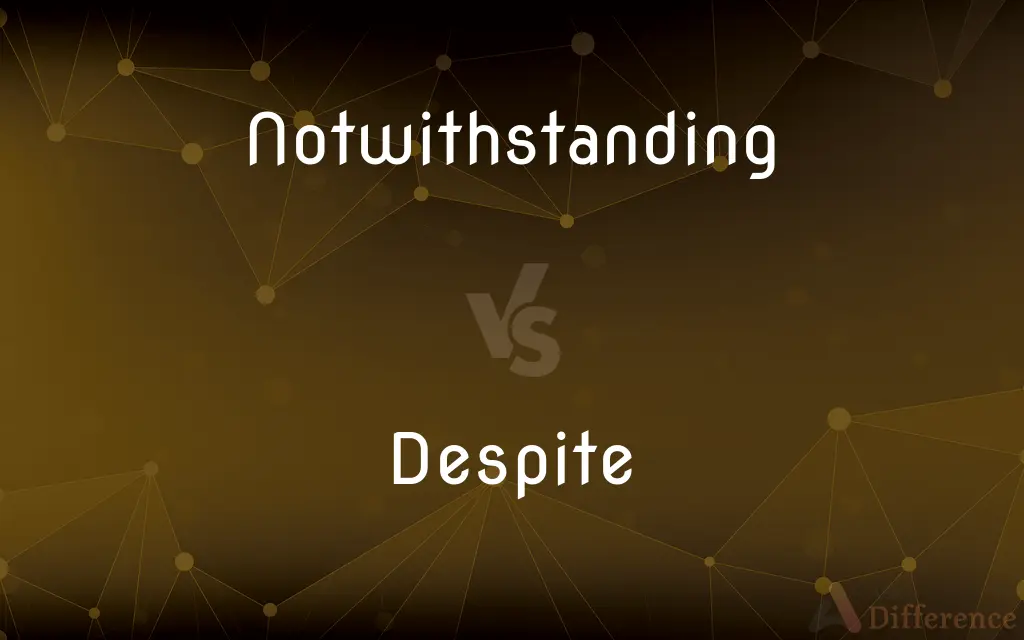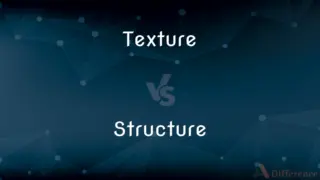Notwithstanding vs. Despite — What's the Difference?
By Tayyaba Rehman & Urooj Arif — Updated on April 4, 2024
Notwithstanding implies "in spite of," often introducing a contrasting idea with a formal tone. Despite shares a similar meaning, signaling contradiction without implying a hierarchy or order of information.

Difference Between Notwithstanding and Despite
Table of Contents
ADVERTISEMENT
Key Differences
Notwithstanding is a formal term used to introduce a statement that contrasts with something previously mentioned, suggesting that the latter does not diminish the truth or importance of the former. It can be used as a preposition, adverb, or conjunction. Despite, on the other hand, is more commonly used in everyday language to indicate that one thing happens or is true even though another thing might have prevented it. Despite is primarily used as a preposition.
While notwithstanding can sometimes give a sense of continuation or concession without undermining the preceding clause, despite directly points to the presence of a hindrance or obstacle that was overcome or ignored. For instance, "Notwithstanding the rain, the parade continued" subtly emphasizes the parade's perseverance, whereas "Despite the rain, the parade continued" straightforwardly notes the rain as an obstacle that was disregarded.
Notwithstanding can also imply a degree of formal resistance or resilience against what is stated, often used in legal or highly formal contexts. Despite, however, simplifies this relationship to a straightforward contradiction without the formal undertones, making it more accessible and commonly used in casual speech and writing.
The placement in sentences also differs; "notwithstanding" can appear at the beginning, middle, or end of a sentence, often followed by its object. "Despite," however, usually precedes the noun or noun phrase it refers to, typically at the beginning of the clause. This positioning reflects the slightly different nuances and formalities each word brings to a sentence.
Both terms serve to introduce contradictions, their usage reflects different levels of formality and emphasis. "Notwithstanding" tends to elevate the discourse, suggesting a more deliberate consideration of the contrasting elements, while "despite" provides a more straightforward and colloquial way to acknowledge contradictions.
ADVERTISEMENT
Comparison Chart
Part of Speech
Can be a preposition, adverb, or conjunction
Primarily used as a preposition
Formality
More formal
Less formal, more commonly used
Implication
Implies a subtle continuation or concession
Directly notes an obstacle or contrast
Usage Context
Often used in legal or formal writing
Widely used in everyday language
Sentence Placement
Flexible: beginning, middle, or end
Typically precedes the noun or phrase
Emphasis
Suggests a deliberate consideration
Straightforward contradiction
Compare with Definitions
Notwithstanding
Yet.
The project was challenging. notwithstanding, it was completed on time.
Despite
In spite of.
She enjoyed the hike despite the cold.
Notwithstanding
Nevertheless.
He was very tired. notwithstanding, he continued to work.
Despite
Even with.
Despite all our efforts, we lost the game.
Notwithstanding
Despite the fact that.
Notwithstanding the severe weather, the event was not canceled.
Despite
Without being affected by.
Despite the rain, the game continued.
Notwithstanding
Although.
Notwithstanding their differences, they worked well together.
Despite
Contrary to.
Despite the advice, he decided to go swimming.
Notwithstanding
In spite of.
Notwithstanding his lack of experience, he completed the task efficiently.
Despite
Regardless of.
He remained cheerful despite his illness.
Notwithstanding
In spite of
This small contretemps notwithstanding, they both had a good time
Notwithstanding the evidence, the consensus is that the jury will not reach a verdict
Despite
Without being affected by; in spite of
He remains a great leader despite age and infirmity
Notwithstanding
Nevertheless; in spite of this
I didn't like it. Notwithstanding, I remained calm
Despite
Contemptuous treatment or behaviour; outrage
The despite done by him to the holy relics
Notwithstanding
Although; in spite of the fact that
Notwithstanding that the hall was packed with bullies, our champion played on steadily and patiently
Despite
Contempt; disdain
The theatre only earns my despite
Notwithstanding
In spite of
The teams played on, notwithstanding the rain.
Despite
In spite of; notwithstanding
Won the game despite overwhelming odds.
Notwithstanding
All the same; nevertheless
We proceeded, notwithstanding.
Despite
Contemptuous defiance or disregard.
Notwithstanding
In spite of the fact that; although.
Despite
Spite; malice
"He died soon after ... of pure despite and vexation" (Sir Walter Scott).
Notwithstanding
Nevertheless, all the same.
He, notwithstanding, persisted in his inquiries.
Despite
In spite of, notwithstanding.
Notwithstanding
Although; despite; even though.
Despite
(obsolete) Disdain, contemptuous feelings, hatred.
Notwithstanding
In spite of, despite.
Notwithstanding personal preferences, the school district's rules on the topic govern our decision
Despite
(archaic) Action or behaviour displaying such feelings; an outrage, insult.
Notwithstanding
Without prevention, or obstruction from or by; in spite of.
We gentil women beeLoth to displease any wight,Notwithstanding our great right.
Those on whom Christ bestowed miraculous cures were so transported that their gratitude made them, notwithstanding his prohibition, proclaim the wonders he had done.
Despite
Evil feeling; malice, spite, annoyance.
Notwithstanding
Nevertheless; however; although; as, I shall go, notwithstanding it rains.
I will surely rend the kingdom from thee, and will give it to thy servant. Notwithstanding, in thy days I will not do it.
They which honor the law as an image of the wisdom of God himself, are, notwithstanding, to know that the same had an end in Christ.
You did wisely and honestly too, notwithstandingShe is the greatest beauty in the parish.
These days were ages to him, notwithstanding that he was basking in the smiles of the pretty Mary.
Despite
(obsolete) To vex; to annoy; to offend contemptuously.
Notwithstanding
Despite anything to the contrary (usually following a concession);
Although I'm a little afraid, however I'd like to try it
While we disliked each other, nevertheless we agreed
He was a stern yet fair master
Granted that it is dangerous, all the same I still want to go
Despite
Malice; malignity; spite; malicious anger; contemptuous hate.
With all thy despite against the land of Israel.
Despite
An act of malice, hatred, or defiance; contemptuous defiance; a deed of contempt.
A despite done against the Most High.
Despite
To vex; to annoy; to offend contemptuously.
Despite
In spite of; against, or in defiance of; notwithstanding; as, despite his prejudices.
Despite
Lack of respect accompanied by a feeling of intense dislike;
He was held in contempt
The despite in which outsiders were held is legendary
Despite
Contemptuous disregard;
She wanted neither favor nor despite
Common Curiosities
What is the difference in formality between notwithstanding and despite?
"Notwithstanding" is more formal, suitable for legal or formal texts, while "despite" is widely used in both formal and informal contexts.
Can notwithstanding and despite be used interchangeably?
While they can often be used interchangeably, "notwithstanding" is more formal and may not always fit the tone of casual speech where "despite" is preferred.
Is notwithstanding old-fashioned?
"Notwithstanding" is considered more formal and slightly old-fashioned, but it is still used in legal, academic, and formal writing.
How does the placement of notwithstanding and despite differ in a sentence?
"Notwithstanding" can be more flexible in placement, while "despite" typically comes before the noun or phrase it is negating.
What does notwithstanding mean?
Notwithstanding is a formal term meaning "in spite of" or "despite," often used to introduce a contrasting or contradictory statement.
Can despite be used as anything other than a preposition?
"Despite" is primarily used as a preposition and is not commonly used as an adverb or conjunction like "notwithstanding."
Why choose notwithstanding over despite?
Choosing "notwithstanding" over "despite" might be due to a preference for formality or to convey a subtle difference in meaning or emphasis.
Does notwithstanding imply a stronger contradiction than despite?
"Notwithstanding" may imply a more deliberate consideration of the contrasting elements, but both terms essentially signal a contradiction.
How do you use despite in a sentence?
"Despite" is used to indicate that something happened or is true even though there might have been something to prevent it, e.g., "Despite the obstacles, she succeeded."
How does the usage of notwithstanding and despite differ in legal contexts?
In legal contexts, "notwithstanding" is preferred for its formality and precision, often used to indicate exceptions within statutory language.
Share Your Discovery

Previous Comparison
Texture vs. Structure
Next Comparison
Blueberry vs. BlackcurrantAuthor Spotlight
Written by
Tayyaba RehmanTayyaba Rehman is a distinguished writer, currently serving as a primary contributor to askdifference.com. As a researcher in semantics and etymology, Tayyaba's passion for the complexity of languages and their distinctions has found a perfect home on the platform. Tayyaba delves into the intricacies of language, distinguishing between commonly confused words and phrases, thereby providing clarity for readers worldwide.
Co-written by
Urooj ArifUrooj is a skilled content writer at Ask Difference, known for her exceptional ability to simplify complex topics into engaging and informative content. With a passion for research and a flair for clear, concise writing, she consistently delivers articles that resonate with our diverse audience.













































